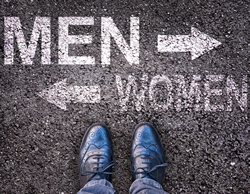Sian Beilock* says gender bias leads highly skilled women to succumb to stereotype-driven expectations, especially in male-dominated fields.

Photo: Delpixart
When it comes to gender equality in the workplace, organisations are keeping a slow — and I do mean slow — and steady pace.
In 2018, Donna Strickland became the first woman in 55 years — and the third woman overall — to win the Nobel Prize in physics, but women are still grossly underrepresented in many STEM fields and are more likely to face gender discrimination on the job.
In other words, progress does not mean parity.
And, working in a climate where you’ve been historically excluded — like in research labs, corporate boardrooms, or even Parliament — can lead women to question their abilities.
As President of Barnard College in New York and a cognitive scientist by training, I’ve spent years observing what causes self-doubt, particularly for women in male-dominated fields.
I’ve observed that there are numerous factors at play.
Chief among them: gender bias that comes in both explicit and subtler forms.
The end result?
Highly skilled women succumb to stereotype-driven expectations.
It begins early when girls as young as six stop believing that girls are the smart ones, while boys continue to believe their gender is gifted.
As women get older, these stereotypes discourage them from pursuing careers thought to be typically reserved for men.
And, with fewer women in a field, subsequent generations of women are deterred from pursuing them.
It’s a vicious cycle, but it can be broken.
Certainly, employers can take steps to encourage women to overcome anxiety and self-doubt in the workplace.
For example, research shows that when women are exposed to powerful female role models, they are more likely to endorse the notion that women are well suited for leadership roles.
So regular meetings — say, monthly check-ins or weekly lunches — between less experienced and more senior women give younger women the opportunity to not only develop professionally but also understand that women have what it takes to succeed in an organisation’s most prestigious roles.
And when mentorship programs are de rigueur, those who face feelings of otherness will not feel deficient for having to proactively seek out career guidance.
However, there are also ways for women to help themselves feel more confident.
In a new job or position?
Worried about whether you can make the cut?
Try writing a journal.
The act of committing thoughts to paper has been shown to decrease worries and rumination and boost the ability to concentrate and focus.
There’s value in getting things “off your chest” and releasing that emotional distress.
Acknowledging fear can help you make sense of it, reduce your negativity and allow you to flourish.
If you sometimes feel like an imposter — that you aren’t really that talented and have fooled anyone who thinks you are — remember that you can have those thoughts and still perform well.
In fact, most women who fall prey to the “imposter syndrome” are actually quite successful at work despite their self-perceived fraudulence.
Reminding yourself of this fact and focusing on your past successes can help prevent a spiral of self-doubt.
Another strategy to employ when overwhelmed, at an impasse or mentally blocked is to take a step back from the problem.
The brain often needs a chance to reboot.
This allows you to see more clearly, find new connections, and devise better solutions.
If something bad does happen, like a bad performance review or a project that misses the mark, it’s also possible to reframe how your brain processes the setback and set yourself up for success the next time around.
Case in point: when researchers studied professional swimmers who failed to make the Canadian Olympic team or swam poorly on a world stage, they found that those who’d been encouraged to acknowledge what went wrong and think about how they could do better next time were able to watch replays of their performance with little negative emotion.
For those who hadn’t done the same review, the video instead stirred a “learned helplessness,” a feeling of lost control which causes people to give up on their goals.
This same idea can translate into the office: rather than give up, acknowledge what went wrong, how it can be improved, and carry this into the future.
Until women are represented equally across all fields, it’s natural that they’ll feel pangs of anxiety as they settle into their careers (especially in environments where they are surrounded by men).
But that anxiety doesn’t need to be crippling.
With employer support, women can thrive by connecting with female mentors, changing how they process negative emotions, and momentarily stepping back from a problem to rethink it.
These are the skills and tools we teach our students at Barnard each day.
And if we make clear that women can, and should, make their voices heard, we can upend the gender imbalances that exist across numerous fields — and get that “slow and steady” pace up to modern speed.
* Sian Beilock is a cognitive scientist, author and President of Barnard College in New York. She tweets at @sianbeilock.
This article first appeared at hbr.org.











